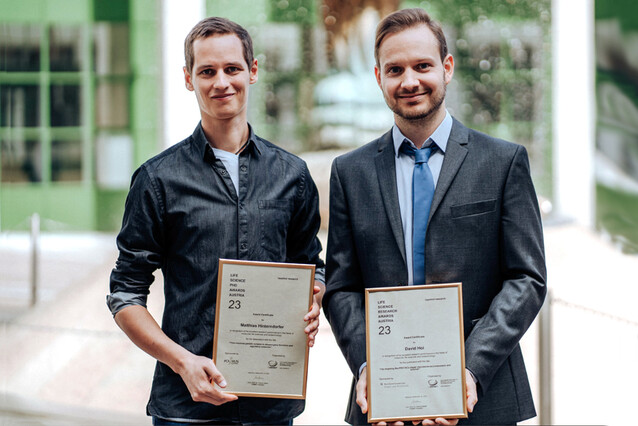Two Life Science Research Awards for IMP PhD graduates
The Austrian Society for Molecular Biosciences and Biotechnology (ÖGMBT) acknowledges the outstanding contribution of young scientists through the annual Life Science Research and PhD Awards. David Hoi from the lab of Tim Clausen and Matthias Hinterndorfer from the lab of Johannes Zuber each won an award at this year’s ceremony for their exceptional doctoral theses.
The Austrian scientific community is booming, as demonstrated by the 19 ERC Grants – eight of which dedicated to Life Sciences – awarded to scientists based in Austria in the latest call. The success of research groups relies on competitive PhD programmes and the dedication of talented students who deserve their share of recognition.
Within the life sciences, the ÖGMBT recognises the achievements of up to five PhD students who have defended outstanding doctoral theses. This year, two IMP PhD graduates were among the awardees.
David Hoi, from the lab of Tim Clausen, won the Life Science Research Award Austria 2023 in the category Applied Research, sponsored by the Federal Ministry of Labour and Economy. During his doctoral studies in the Vienna BioCenter PhD Program, Hoi harnessed the BacPROTAC technology to develop an antimicrobial agent that forces targeted bacterial proteins into suicide. The method, tested on the pathogen Mycobacterium tuberculosis, has a huge potential in the fight against antibiotic resistance. Together with his co-first author Sabryna Junker, he published his results in the journal Cell.
During his PhD with Johannes Zuber, Matthias Hinterndorfer engineered a pipeline for high-quality, genome-wide CRISPR/Cas9 screening that enables the identification of essential genes and their regulators. He developed a time-controlled CRISPR screening assay in which Cas9, the ‘DNA scissors’ that knock genes out, can be expressed on demand. This allows scientists to study the immediate consequences of gene knockouts before potential lethal effects can occur. He applied this method with his colleague Melanie de Almeida to identify regulators of MYC, a protein essential for the growth of cancer cells. They identified and characterised AKIRIN2, an essential protein that plays a fundamental role in keeping the cell nucleus clean. In 2021, they published their findings in the journal Nature. The ÖGMBT presented Hinterndorfer with the Life Science PhD Award Austria 2023 in the category Applied Research, sponsored by Polymun and THP Medical Products.
The awards were presented during an official ceremony at the Society’s 15th Annual Meeting at the University of Salzburg. Johanna Gassler, another PhD student in the Vienna BioCenter PhD Program in the Tachibana Lab at IMBA, was also one of the awardees.
The Vienna BioCenter PhD Program has an open call, with over 30 open positions covering many research areas in the Molecular Life Sciences. Consult the program’s website and apply before 15 October.
Further reading
On David Hoi’s research: Fighting tuberculosis with bacterial self-sabotage
On Matthias Hinterndorfer’s research: How cells keep their nucleus clean: a fundamental discovery
